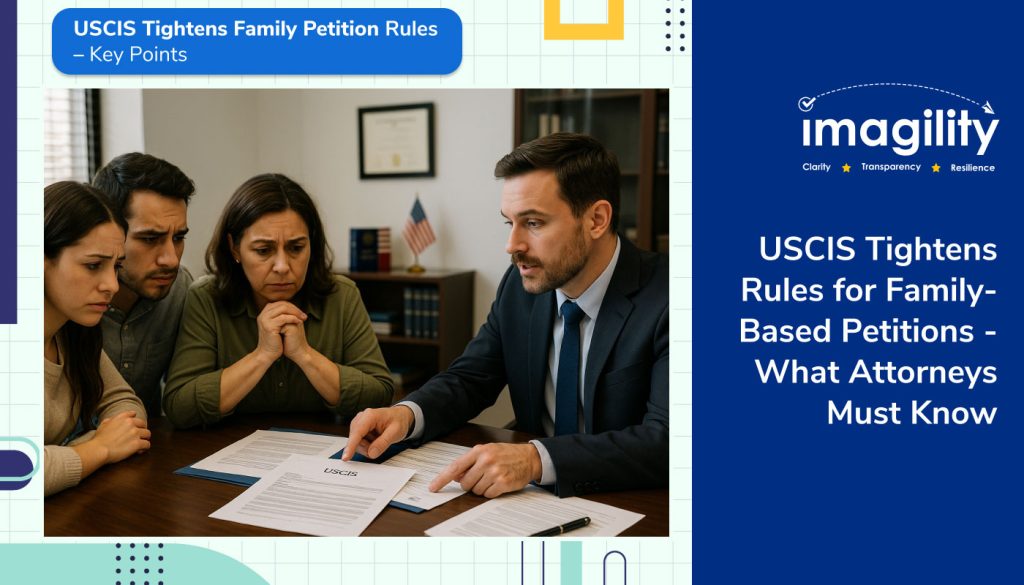As of August 1, 2025, family-based immigration attorneys face a far stricter environment when filing green card petitions. USCIS officers can now deny petitions immediately if key documents are missing or eligibility is unclear, without issuing a Request for Evidence (RFE) or a Notice of Intent to Deny (NOID).
This change removes the safety net that once allowed attorneys to correct errors after submission. For clients without legal status, a denial may also trigger a Notice to Appear (NTA), beginning deportation proceedings.
What Has Changed from August 1, 2025?
This policy update affects all family-based petitions, whether filed by U.S. citizens or lawful permanent residents on behalf of a spouse, child, parent, or sibling.
1. Immediate Denials Without Warning
In the past, attorneys could rely on RFEs and NOIDs to fix minor errors or add missing evidence. But now, a missing page, a wrong date, or incomplete proof can lead directly to denial.
- RFE (Request for Evidence) – to request missing documents
- NOID (Notice of Intent to Deny) – to warn before denial
Under the new rules, both steps can be skipped. If the application is missing an important document or has an error, the case can be denied. Even minor mistakes can lead to serious consequences.
2. Increased Deportation Risk for Vulnerable Clients
For applicants without legal status in the U.S., a denial now comes with a greater risk. USCIS can issue a Notice to Appear (NTA), starting the deportation process. Those most vulnerable include:
- Undocumented applicants applying through a U.S. citizen relative
- Applicants pursuing consular processing after a waiver
How Does This Impact Attorneys?
Family-based petitions already require careful preparation. With these rules in place:
- There is no room for oversight, and even small errors can mean a denial.
- Timelines get tighter, and you must get it right the first time.
- Client risks increase, and especially for undocumented clients or those seeking consular processing after a waiver.
Attorneys now carry a greater responsibility to ensure petitions are complete, accurate, and well-documented from the start.
Why is USCIS Making This Policy Change?
According to USCIS, the stricter policy aims to maintain system integrity and reduce fraudulent or weak applications. With family-based immigration making up about 40% of all green card approvals each year, the government body wants stronger, more credible evidence in every family-based visa petition. In this climate, your clients will depend on you more than ever to ensure their petitions are complete and error-free.
What Should Attorneys Do Now?
To protect clients, attorneys should:
- Double-check every petition before filing
- Ensure complete evidence of family relationships
- Verify all pages, signatures, and dates match
- Anticipate potential officer concerns before submission
How Imagility Empowers Attorneys to Stay Ahead
In a policy environment where accuracy is non-negotiable, Imagility gives attorneys a powerful edge. This AI-enabled immigration platform works alongside your expertise to:
- Build winning petitions with intelligent document checklists
- Run AI-driven eligibility checks to identify and resolve risks before filing
- Organize evidence in a format aligned with how USCIS officers review cases
- Reduce delays, denials, and deportation triggers by identifying potential pitfalls
Imagility’s AI-based petition analysis reviews every element of a petition as an officer would, generating detailed reports with actionable recommendations. Attorneys can then refine and strengthen the case before submission, ensuring a far higher success rate.
Bottom Line
From August 1, 2025 onward, there are no safety nets for family-based immigration petitions. A single overlooked detail could derail your client’s future. With Imagility, you can combine your legal expertise with advanced AI technology to deliver petitions that meet the highest standards of accuracy and completeness, protecting your clients, safeguarding their status, and strengthening your immigration practice.










